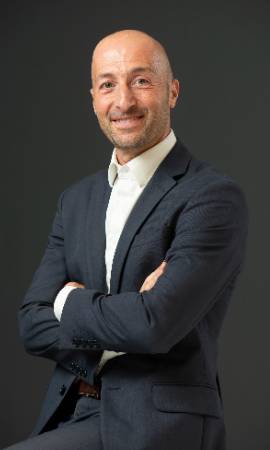What started out as a team of project managers dedicated to bolstering Corinthia Group's global expansion some 35 years ago has nowadays transformed into a sophisticated professional services firm. Today, many will be familiar with the name QP, and it is recognised as a leading company specialising in the design, engineering and management of construction, infrastructure, and environmental projects.
Describing QP's evolution as nothing short of remarkable, Senior Partner Ramon Fenech says it has blossomed into a comprehensive multi-disciplinary entity – “an aspect that stands virtually unparalleled in terms of both its characteristics and scale across the Maltese Islands.”
Indeed, the firm now offers an all-encompassing array of design, engineering, and management services, bringing together every facet of the built environment.
Delving into the company’s landmarks since inception, Ramon believes that QP's capacity to provide a comprehensive spectrum of services all in one place is not only appealing but also offers numerous advantages.
“Whilst we are based in Malta, our operations span multiple countries. This places us among the select few companies capable of managing projects, regardless of their scale, right from initial conceptualisation to the final touches, down to the smallest detail,” he says, noting that QP’s expansive clientele, spread across the globe, not only enjoys the convenience of accessing an array of services from a single source but also reaps the rewards of unparalleled dedication to precision and a steadfast commitment to meeting the most exacting standards.
“Our international endeavours have encompassed a diverse range of project sizes and contexts. These span from feasibility studies, proposals for master plans, and large-scale infrastructure ventures, down to individual residential undertakings and meticulous interior and fitting designs. Our approach to each project is tailored, ensuring that our clients receive precisely what they desire when they desire it, and tailored to their specific preferences,” he continues.

In addition, QP’s projects vary in size and complexity, spanning from small residential buildings to large public buildings including hotels, industrial facilities, airports and infrastructural projects. Among the array of ongoing endeavours, Ramon highlights three projects that hold notable significance: the Sustainable Living Complex at the University of Malta, the development of Apron 10 at Malta International Airport, and Corinthia's Oasis Project in Golden Sands. “What especially brings me contentment is the substantial number of returning clients we have garnered, as this serves as a significant affirmation of our work,” he smiles.
Turning our attention to the Senior Partner himself, Ramon reveals how, upon completing his studies in 2000, he joined a well-established local firm specialising in architecture, civil and structural engineering, which would go on to merge with QP in 2012.
“During that time, QP had already established itself as a comprehensive provider of professional services within the construction sector, apart from architecture and structural engineering. The merger brought about a transformative change. With the subsequent integration of the Cultural Heritage and Land Surveying Department, QP evolved into a unified destination offering a complete suite of professional services spanning the construction industry,” he explains.
As a result, Ramon considers himself privileged to have progressed from a novice graduate to overseeing one of Malta's foremost design, engineering, and management enterprises.
As Head of Operations and the leader of the Structural Engineering Team, he’s got a lot on his plate, with multifaceted responsibilities linked to ensuring the success of QP’s projects.
“In collaboration with the other Senior Partners, I oversee the overall management of our operations, from project initiation to completion, aiming to maintain seamless workflow and adherence to our high standards,” he says, first and foremost. Then, with regards to managing the Structural Engineering Team, this primarily involves collaborating with the team members to devise innovative and practical solutions for the challenges presented by each project.
“The role of the structural engineer is primarily to design and supervise the construction of buildings, ensuring that buildings are strong enough to support the loads on them (like people and equipment) and are stable against elements such as wind, whilst remaining cost-efficient,” he goes on to explain, noting that structural engineers make sure buildings and infrastructure are safe to use, and therefore carry very important responsibility.
“This involves conceptualising, designing, and analysing structural components to ensure their integrity and safety within the built environment. I consider myself very lucky and proud to be surrounded by an excellent team of engineers and draftspersons at QP, all having expertise in different sectors,” Ramon adds.
Part of his role also involves liaising with clients, understanding their needs, and translating them into actionable project requirements. “I ensure that we deliver not only technical excellence but also a seamless client experience, cultivating lasting relationships and – as evidenced by our returning clientele – earning their trust.”
In essence, Ramon’s role revolves around strategic leadership, technical expertise, and effective communication to contribute to the overall success of QP’s projects.
Looking ahead, the Senior Partner described his primary focus as one that revolves around “fostering a culture and work environment where team members are encouraged to contribute ideas, perform at their peak, and genuinely sense their worth and importance.”
In terms of QP's growth on both local and international fronts, Ramon sees an exciting opportunity emerging in meeting the raising demands for integrated design solutions. However, the challenge lies in maintaining the company’s core values and principles amidst expansion.
“Striking the right balance between growth and upholding our commitment to quality, innovation, and personalised service is crucial. Ensuring our team remains aligned with our original vision and fostering a cohesive culture are also challenges we're mindful of. By addressing these challenges proactively, we're positioned to leverage opportunities while staying true to our foundation,” he concludes.
Main Image:
